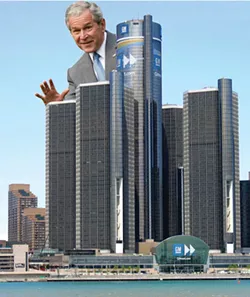Well, it’s Thanksgiving weekend, and all across America, those who can afford it are getting ready to overeat.
And this year, regardless of whether you’re eating turkey, Tofurkey, Turducken, ham, kale — or volunteer at a mission — there is something to celebrate: Genuinely good economic news.
Not enough of it, to be sure. Though the economy is slowly getting better, there is little growth in lower-paying jobs.
Last week’s annual University of Michigan economic forecast was optimistic that state unemployment would decline from 9.1 percent to 7.3 percent over the next two years. That’s great news — if you aren’t one of the unlucky ones.
There was one momentous announcement, however, that serves as a magnificent rebuttal to those who decry that government programs — especially government bailouts — never work.
The U.S. Treasury announced it is getting out of the car business, selling off its last remaining General Motors stock by the end of the year. Stock prices fluctuate, but the newspapers are saying that when all is said and done the taxpayers will have “lost” about a net $10 billion on the General Motors stock.
Few statements could be as misleading. True, the Treasury spent about $49.5 billion to keep GM going in 2008 and 2009. It looks now as if the taxpayers will get back only about $39 billion or so, give or take a few hundred million.
But to say we “lost” $10 billion on the bailout is exactly like saying you “lost” $30 bucks because you had an oil change, instead of waiting till your engine exploded.
Here’s what would have happened if the government had not “bailed out” General Motors and Chrysler, and helped them to a soft landing: They would have gone out of business with a thud.
According to economists at CAR, the Ann Arbor-based Center for Automotive Research, this might have toppled Ford Motor Co. into bankruptcy as well, since many suppliers who supply all of the Detroit Three might have gone under as a result.
Had the government not stepped in to save the country’s domestic automakers, what that would have meant — especially in this region — is nothing short of a second Great Depression. At one point, CAR estimated that the bailouts of GM and Chrysler saved more than 1.14 million jobs in 2009, alone. Hundreds of thousands more jobs would have been lost the next year — and the year after.
Free-market devotees who don’t know what they are talking about sometimes argue that private banks could have bailed the auto industry out. They forget there was no money available at the time — absolutely none — at the start of the Great Recession. Indeed, there was some fear the entire banking system was in jeopardy. Remember the panic on Wall Street? Lehman Brothers?
What about private equity and venture capital companies? We sometimes forget that the worst-ever owner Chrysler had was an outfit called Cerberus Capital Management; that in just two short years left Chrysler a shell of its former self — without new product in the pipeline.
The only force big enough five years ago to save General Motors and Chrysler was the U.S. government. And every good liberal needs to give full credit to the man who did it:
President George W. Bush. That’s right. It was he, not Barack Obama, who put up the first $17.4 billion to save the automakers before he left office.
Later, President Obama finished the job. It was Obama who pushed Chrysler into a marriage with Fiat, the only way that company would survive. He also forced out GM’s old, incompetent management and forced a sea change in the car company’s culture. We now know the result.
General Motors made $2.2 billion on its North American operations in the third quarter of this year alone. Chrysler was making nearly half a billion dollars at the same time. Chrysler’s bailout, incidentally, cost the taxpayers a net $1.7 billion. Let’s say the auto bailouts, total, end up costing the taxpayers $12 billion. Know how much that is?
A little less than one-fifth what we spent on the war in Afghanistan in just fiscal 2009 — the year of the bailouts. How much did we get back in return for that spending?
Once again — had Washington not bailed out General Motors and Chrysler, CAR estimates the cost to the U.S. Treasury at $156 billion. That’s billion; with a “b!” The loss in personal income, by the end of 2011, would have been $400 billion; “b.” Imagine the horror.
Yes, our meddling, interfering old federal government, disrupted the hidden hand of the free market … and saved us all.
Thank God for the nanny state!
Minimum Wage
Ever try feeding, clothing and housing a family — for a year — on $19,240? Not a lot left over for frivolities like smart phones or, well, good toilet paper.
Less than $20,000 annually is not, no matter how carefully you plan, rolling in dough. But if you thought I was talking about life on a minimum wage income, guess again.
Today, a worker earning minimum wage would only make a little over $15,000 — assuming she or he was paid for a 40-hour week and worked an entire year. That’s based on our current minimum wage of $7.40 an hour; a figure that hasn’t been raised in seven years. The higher annual figure is what Mark Schauer, next year’s Democratic candidate for governor, wants.
A less-than-magnificent $19,240 income is based on a wage of $9.25 an hour, and, of course, wouldn’t apply to a lot of folks — like restaurant waitstaff. Schauer says he wouldn’t do it all at once; if he had the power to do so, he’d phase it in over three years. But even that, however, was enough to set off a howl on the right and among the usual millionaires.
Gov. Rick Snyder immediately issued a statement saying that this proposal “could pose real challenges.” This from a man who did not blink at cutting education spending to give businesses more than a billion-dollar tax cut when he came into office.
Sara Wurfel, his spokesperson, huffed that giving the lowest-paid workers a little more money “may have unintended consequences,” whatever that means.
That’s not what the chambers of commerce would say, however. They would argue that raising the minimum wage would cause more misery for the poor because employers who couldn’t afford the higher rates would let them all go.
Yes, and I suppose the millionaires would then be forced to clean the toilets themselves. Guess what: They’d pay it. The same arguments against raising the minimum wage were used — almost verbatim — when that old commie Franklin D. Roosevelt first managed to establish a minimum wage in 1938. Then, it was 25 cents an hour.
Now, there is no way Mark Schauer’s proposal is going to become law — though it should. Even if he beats Snyder next year, and Democrats improbably capture the state house of representatives, Republicans are still going to hold the state senate.
But raising the minimum wage would be both fair and economically smart. The poorest workers are not going to send anything extra they get to a bank in Bermuda. They are instantly going to spend it, causing a ripple effect that will stimulate the economy. By the way, know when the U.S. minimum wage was at its highest level, ever?
Way back in 1968, when — adjusted for inflation — it was $10.61 an hour, in last year’s dollars, according to Wikipedia.
What’s that you say? That was back when we had a middle class? When economic disparity was shrinking and national unemployment was 3.7 percent? Lord, aren’t we glad we aren’t suffering from those misguided domestic policies anymore!






